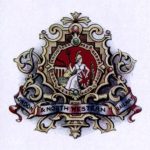Lightning has struck twice! More than a year ago, I wrote about my surprise (and slight suspicion) when someone contacted me seeking information about the Rev. Moses Marcus. As I wrote at that time, “In case another soul on the planet ever wants more information, I periodically check to see if I can find anything new about Moses Marcus.” It turns out that at least one other soul was interested!
I was contacted in March by a professional genealogist who had seen a query on JewishGen seeking information about Moses’s younger brother, Henry Robert Marcus. The genealogist found Henry in my online tree and wondered whether I might be able to help.
As it happened, I had just made several useful discoveries about the family through FamilySearch.org, a resource I had not previously used much. I guess it seemed easier to use tried-and-try sources rather than going through the learning curve of mastering a new website, but I realized the error of my ways once I got going. In almost no time I discovered a missing child that I’d long suspected, as well as the existence of several helpful death notices and obituaries.
In almost no time I discovered a missing child that I’d long suspected, as well as the existence of several helpful death notices and obituaries.
Seasoned genealogists know that, before the days of contraception, the average couple produced a child about a year after marriage, with further pregnancies occurring approximately every other year. Moses Marcus and his two wives followed this scenario pretty well, but there was a three-and-a-half year gap between his first and second-known child. I found the missing child on FamilySearch: Thomas James Marcus, born 21 October 1819, baptized 26 July 1820, died 28 October 1820. The problem in locating him earlier seems to have been caused by mis-transcription of the baptismal record as “Warcus” instead of “Marcus.”
Family Search also alerted me to several newspaper obituaries; I couldn’t read them from home, but I could view them at my local Family History Center. My first trip there was very productive, and the volunteer incredibly helpful. I will definitely make use of this free resource in the future! While I wouldn’t trade my consultation with a professional genealogist at NEHGS last fall for anything, it’s nice knowing that other resources are available close to home. There is probably a Family History Center near you, too, wherever you live.
"He was deservedly respected and admired by all who knew him, not only for the urbanity of his manners, but for his very extensive knowledge as a linguist, having been perfect master of the Hebrew, French, German, Spanish, Italian, Dutch, and English languages; all of which he spoke with great fluency."
I was able to find a lovely tribute to Moses Marcus, senior (the father of Henry Robert Marcus and the Rev. Moses Marcus), dated 19 May 1824 in the Derby Mercury: “On the 3d instant, at his house in Irwell-street, Manchester, after an illness of a few days, Mr. M. Marcus, in the 62nd year of his age. He was deservedly respected and admired by all who knew him, not only for the urbanity of his manners, but for his very extensive knowledge as a linguist, having been perfect master of the Hebrew, French, German, Spanish, Italian, Dutch, and English languages; all of which he spoke with great fluency.”
This expanded the little I’d gleaned about him from a son’s marriage record, which listed him as “linguist.” It also helped explain how his eldest, namesake son had been able to publish a Hebrew grammar in 1826, and to serve as chaplain to the English community in Ostend (located in the Dutch-speaking portion of Belgium). As for Henry Robert Marcus, ironically he was killed by the very thing that had made him somewhat famous throughout Europe. This news item appeared 11 December 1875 in the Liverpool Mercury:
“We have to record the death, under very melancholy circumstances, of a gentleman whose name was at one time familiar throughout the country, viz, Mr. Henry Robert Marcus, the originator of the railway excursion system. The deceased gentleman, who was in his 72nd year, had for some time abandoned his railway enterprise, and was latterly connected, as managing director, with the Victoria Colliery Company, Rainford, but resided at Falkner-street, in this town. Shortly before four o’clock yesterday afternoon, Mr. Marcus left the colliery for home, walking along the line of the London and Northwestern Railway Company to Rainford Junction, knowing that no train was due at the time. He had not, however, got more than 100 yards from the colliery when a special engine and tender came along at a rapid rate. Mr. Marcus, being somewhat deaf, did not hear the signal made to him, and, before the driver could stop the engine, Mr. Marcus was struck by the tender, and instantly rendered insensible. He breathed for a few minutes, but, on the arrival of a doctor, life was pronounced extinct.”
It appears that Henry Marcus’s intimate but incomplete knowledge of the train system’s operations led to his demise: “A little knowledge is a dangerous thing.”
Share this:

About Pamela Athearn Filbert
Pamela Athearn Filbert was born in Berkeley, California, but considers herself a “native Oregonian born in exile,” since her maternal great-great-grandparents arrived via the Oregon Trail, and she herself moved to Oregon well before her second birthday. She met her husband (an actual native Oregonian whose parents lived two blocks from hers in Berkeley) in London, England. She holds a B.A. from the University of Oregon, and has worked as a newsletter and book editor in New York City and Salem, Oregon; she was most recently the college and career program coordinator at her local high school.View all posts by Pamela Athearn Filbert →
